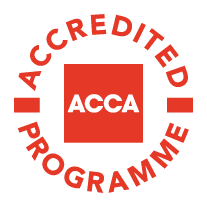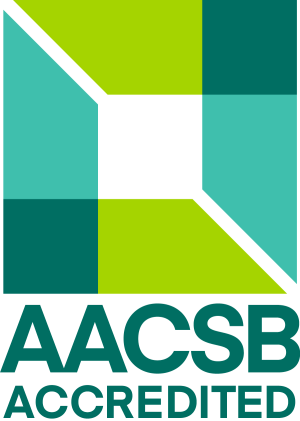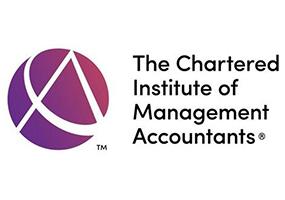
Showing content for section Overview
Overview
The digitalisation of accounting and financial management in modern business means that professionals with the skills and aptitude to identify, analyse and use vast amounts of financial data are in high demand.
On this Accounting and Data Analytics Master's degree, you'll build a proficiency in accounting, expanding your knowledge of accounting and analytical software, report writing, and data and critical analysis. You'll get the confidence and skill to use the findings from the data you analyse to make strategic business decisions.
You'll graduate with a flexible and sought after skill set, opening the door to jobs in banking, accounting and the financial sector, as well as more specific roles like forensic accounting.
Accreditation
This course is accredited by the Association of Chartered Certified Accountants (ACCA) and the Chartered Institute of Management Accounting (CIMA).
Contact Information
Contact Student Recruitment CentreEntry requirements
MSc Accounting and Data Analytics Master's degree entry requirements
Qualifications and experience
A second-class honours degree or equivalent professional experience and/or qualifications.
English entry requirements
English language proficiency at a minimum of IELTS band 6.5 with no component score below 6.0.
If you don't meet the English language requirements yet, you can achieve the level you need by successfully completing a pre-sessional English programme before you start your course.
What you'll experience
On this Accounting and Data Analytics Master's course you'll:
- Combine big data theory, business acumen and communication ability into a sought after skill set
- Improve your financial analysis and data visualisation skills
- Learn how to prepare and analyse accounts
- Get experience with analytical software
- Learn how to effectively analyse financial data to achieve certain goals, such as internal auditing
- Access the same data, analytics and software used by city traders in our Bloomberg Suite
- Study alongside students from our MSc Forensic Accounting and MSc Accounting and Finance courses, so you'll experience other areas of accounting and get a better idea of what to expect in the workplace
- Develop transferable skills such as business acumen, professional ethics, critical analysis, report writing, communication skills and data analysis
- Be able to attend guest lectures, which illustrate how you can apply the knowledge and skill you learn in industry
- Study modules that accelerate the path to membership of accounting professional bodies after the course
Programming skills are not required on this course.
Careers and opportunities
When you finish this Accounting and Data Analytics Master's course, our Careers and Employability service can help you find a job that puts your skills to work in the industry.
What can you do with an Accounting and Data Analytics Master's degree?
Areas that you could go on to work in include:
- accounting
- banking
- financial sector businesses
- internal and external auditing
- forensic technology
- professional services
What jobs can you do with an Accounting and Data Analytics Master's degree?
Roles you could go onto include:
- management accountant
- financial accountant
- external auditor
- internal auditor
- financial analyst
- consultant
Other graduates have set up successful businesses with help and support from the University.
After you leave the University, you can get help, advice and support for up to 5 years from our Careers and Employability service as you advance in your career.
Work experience and career planning
To give you the best chance of securing a great job when you graduate, our Careers and Employability service can help you find relevant work experience during your course.
We can help you identify placements, internships, voluntary roles and other opportunities to build your CV.
Modules
Each module on this course is worth 15 credits. You'll need to study modules worth a total of 180 credits.
Modules currently being studied
Core modules on this Accounting and Data Analytics Master's course are:
- Corporate Governance and Ethics - 15 credits
- Data Analysis and Visualisation - 15 credits
- Database Design and Implementation - 15 credits
- Dissertation - 45 credits
- Financial Accounting - 15 credits
- Financial Analysis - 15 credits
- Statistics and Data Modelling I - 15 credits
- Strategic Management Accounting - 15 credits
Optional modules include:
- Business Valuation - 15 credits
- Corporate Finance - 15 credits
- Fraud Examination and Forensic Investigations - 15 credits
- Valuations and the Expert Report - 15 credits
Changes to course content
We use the best and most current research and professional practice alongside feedback from our students to make sure course content is relevant to your future career or further studies.
Therefore, course content is revised and regularly reviewed. This may result in changes being made in order to reflect developments in research, learning from practice and changes in policy at both national and local levels.
How you'll spend your time
We recognise that you'll probably be juggling more demands when you do your Master's degree, as you may be working or you may have family responsibilities.
We'll give you as much indication here as we can of how much time you'll need to be on campus and how many hours you can expect to spend in self-directed study, but please note that these indications are always subject to change. You should receive your full timetable several weeks before you start with us.
We recommend you spend at least 40 hours a week (full time) or 20 hours a week (part time) studying for your Accounting and Data Analytics Master's degree.
You’ll be in timetabled teaching activities such as lectures and seminars for around 15 hours a week (full time) or 5 hours a week (part time). You'll spend the rest of the time studying independently, completing tasks such as researching, reading, working on coursework and project work, alone or in a group with others from your course.
Most timetabled teaching takes place during the day, Monday to Friday. You may occasionally need to go to University and course events in the evenings and at weekends. There’s usually no teaching on Wednesday afternoons.
Teaching
Teaching on this course includes:
- lectures
- seminars
- workshops
- online learning
Teaching staff include professional accountants who will provide you with real-world context and demonstrate how to apply what you've learnet and quantitative researchers who will provide you with insight into the latest findings in the area.
You can access all teaching resources on Moodle, our virtual learning environment, from anywhere with a Web connection.
How you're assessed
You'll be assessed through:
- exams
- coursework
- reports
- optional module cross examination
You'll be able to test your skills and knowledge informally before you do assessments that count towards your final mark.
You can get feedback on practice and formal assessments so you can improve in the future.
Supporting you
You'll get face-to-face support from teaching and support staff when you need it. These include the following people and services:
Personal tutor
Your personal tutor gives you academic and personal support throughout your time at university.
As well as regular scheduled meetings with your personal tutor, they're also available at set times during the week if you want to chat with them about anything that can't wait until your next meeting.
Student engagement officers
In addition to the support you get from your personal tutor, you’ll also have support from student engagement officers. They can give you confidential, impartial advice on anything to do with your studies and personal wellbeing, and refer you to specialist support services if you need extra help or support.
Study support tutors
You'll have help from a team of faculty study support tutors. They can help you improve and develop your academic skills and support you in any area of your study.
They can help with:
- Improving your academic writing (for example, essays, reports, dissertations)
- Delivering presentations (including observing and filming presentations)
- Understanding and using assignment feedback
- Managing your time and workload
- Revision and exam techniques
Academic skills support
As well as support from faculty staff and your personal tutor, you can use the University’s Academic Skills Unit (ASK).
ASK provides one-to-one support in areas such as:
- academic writing
- note taking
- time management
- critical thinking
- presentation skills
- referencing
- working in groups
- revision, memory and exam techniques
If you have a disability or need extra support, the Additional Support and Disability Centre (ASDAC) will give you help, support and advice.
Library support
Library staff are available in person or by email, phone or online chat to help you make the most of the University’s library resources. You can also request one-to-one appointments and get support from librarians who specialise in business and law.
The library is open 24 hours a day, every day, in term time.
Term dates
The academic year runs from September to June. There are breaks at Christmas and Easter.
Course costs and funding
Tuition fees (September 2024 start)
- Full-time: £12,000
- Part-time: £4,000 a year (3 years – may be subject to annual increase)
(including Transition Scholarship)
- Full-time: £12,000
- Part-time: £4,000 a year (3 years – may be subject to annual increase)
- Full-time: £19,200
- Part-time: £6,400 a year (3 years – may be subject to annual increase)
Tuition fees terms and conditions
Funding your studies
Find out more how to fund your studies, including the scholarships and bursaries you could get. You can also find more about tuition fees and living costs, including what your tuition fees cover.
If you're a UK student, you may be eligible for a Government postgraduate loan, which you can use to help with course fees and living costs.
Applying from outside the UK? Find out about funding options for international students and our international student scholarships.
Additional costs
Our accommodation section shows your accommodation options and highlights how much it costs to live in Portsmouth.
You’ll study up to 6 units a year. You may have to read several recommended books or textbooks for each unit.
You can borrow most of these from the Library. If you buy these, they may cost up to £60 each.
We recommend that you budget £75 a year for photocopying, memory sticks, DVDs and CDs, printing charges, binding and specialist printing.
If your final year includes a major project, there could be cost for transport or accommodation related to your research activities. The amount will depend on the project you choose.
Apply
September 2024 start
- Full-time study (1 year)
- Part-time study (30 months)
International students
If you're from outside of the UK, you can apply directly to us (above) or you can get an agent to help with your application. Check your country page for details of agents in your region. To find out what to include in your application, head to the how to apply page of our international students section.
If you don’t meet the English language requirements for this course yet, you can achieve the level you need by successfully completing a pre-sessional English programme before you start your course.
Admissions terms and conditions
When you accept an offer to study at the University of Portsmouth, you also agree to abide by our Student Contract (which includes the University's relevant policies, rules and regulations). You should read and consider these before you apply.



